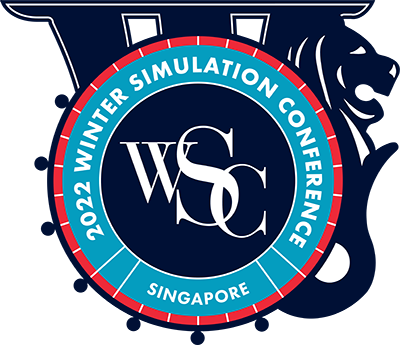In 2022, ACM-SIGSIM and INFORMS-Sim will once again sponsor the Ph.D. Colloquium for Ph.D. students that are within two years of graduation (planning to graduate by December 2024). Students close to graduation will be given an opportunity to showcase their work during a short presentation session during the Colloquium (apart from the regular tracks). Presenting your Ph.D. work to your peers and the larger simulation community will give you the opportunity to receive valuable feedback and ideas, as well as introduce you to a network that can be very helpful with your career once you graduate.
Ph.D. Colloquium Committee 2022
Chair
Anatoli Djanatliev, Friedrich-Alexander-Universität Erlangen-Nürnberg
Members
Jose Padilla, Old Dominion University
Siyang Gao, City University of Hong Kong
Chang-Han Rhee, Northwestern University
Cristina Ruiz Martin, Carleton University
Keynote Speaker
Wentong Cai, Nanyang Technological University
Towards Data-Driven Agent-based Modeling and Simulation
The importance of data analytics techniques in modeling and simulation (M&S) and how they can be applied to various phases of M&S have been addressed in various recent articles. In this talk, we will specifically explore the synergy between data analytics and agent-based modeling and simulation (ABMS) and discuss the challenges of applying data-driven techniques in ABMS. Traditional methods to create agent-based model require in-depth domain knowledge and involve a great deal of manual efforts. Our work has shown that it is possible to use analytics techniques to extract useful knowledge and insight from the data to facilitate model development for agent-based simulations. In this talk, you’ll see illustrated the data-driven modeling techniques using our recent work on agent-based crowd and traffic simulation. In addition, we have also developed a framework for “just-in-time” analysis of the simulation data to infer the usefulness (or utility) of a simulation run. This technique can reduce overall resource utilization of an agent-based simulation study, which often involves a large number of simulation runs (i.e., an ensemble of simulations). The talk will end with some future directions of data-driven agent-based modeling and simulation.
Ph.D. Colloquium Participation Options
There are three options to participate in the Ph.D. Colloquium with different benefits:
- Poster Only: Submit a 2-page extended abstract and participate in the Ph.D. Colloquium poster session only.
Benefit 1: If accepted, both ACM-SIGSIM and INFORMS-Sim provide a complimentary one-year membership. - Poster and Presentation: Submit a presentation in addition to your 2-page extended abstract.
Benefit 1: Both ACM-SIGSIM and INFORMS-Sim provide a complimentary one-year membership.
Benefit 2: ACM-SIGSIM and INFORMS-Sim will reimburse the conference registration fee. - Poster, Presentation, and Full Paper: Submit a 2-page extended abstract and a presentation for the Ph.D. Colloquium. In addition, you have submitted a full paper to a regular track (a contributed paper, not an invited paper) and it has been accepted.
Benefit 1: Both ACM-SIGSIM and INFORMS-Sim provide a complimentary one-year membership.
Benefit 2: ACM-SIGSIM and INFORMS-Sim will reimburse the conference registration fee.
Benefit 3: You will be eligible to compete for a best paper award, provided your full paper is accepted in a regular track.
ACM-SIGSIM and INFORMS-Sim will each award a Best Ph.D. Student Paper prize among those students making a presentation at both the Ph.D. Colloquium and in a regular track at the conference.
Those students who have a contributed paper in a regular track will be eligible for the Best Paper awards. Note that invited papers cannot be considered for the Best Paper awards. Students interested in competing for a Best Paper award should include their contributed paper ID when completing the Ph.D. Colloquium submission. An email should also be sent to the chair of the Ph.D. Colloquium that includes the contributed paper ID and indicates intent to participate in the Best Paper competition.
Ph.D. Colloquium participants have to be present at all events (colloquium and poster sessions, WSC opening session, ACM-SIGSIM and INFORMS-Sim meetings) in order to be eligible for all benefits.
Note: Students who showcase their work as a poster in the regular WSC poster session are not eligible to participate in the Colloquium (and vice versa). Hence, one should select to participate in either the regular poster session or the Colloquium (not both).
Submission Requirements
Students interested in participating in the colloquium should submit a 2-page extended abstract by September 30 using the WSC submission system. Extended abstracts are used for designing the tracks and are included in the proceedings distributed to conference attendees, but they are not included in the archival version of the proceedings in IEEE and ACM repositories. The extended abstract is required for all three Colloquium participation options. The abstract should have a single author (the student) and must be formatted using the poster template in the WSC Author’s Kit. In addition, the advisor needs to send an email to the chair of the Ph.D. Colloquium Committee by October 10, 2022 that states:
- That the Ph.D. student is within two years of graduation
- That the Ph.D. student is the main author of the submission
- That the Ph.D. student will attend 2022 WSC and participate in the Ph.D. Colloquium
Students are only allowed to participate in a WSC Ph.D. Colloquium one time.
Additional Information about the Colloquium
Presentations:
If you submit a student paper for the conference, you can use your presentation for the Ph.D. colloquium as well as for the track presentation. You may need to edit the slides, as we may have more time constraints. This year, presentations will be around 5 minute pitches followed by a brief Q&A. You do not have to present something special in the Ph.D. colloquium that cannot be used in the regular sessions.
Student Papers:
Student papers are part of the regular conference and fall under the submission and review guidelines as documented on this WSC website. A full paper is not required to participate in the Ph.D. Colloquium. However, if you have an accepted paper at WSC 2022 and participate in the Ph.D. Colloquium, then you are also eligible to compete for a Best Paper award.
